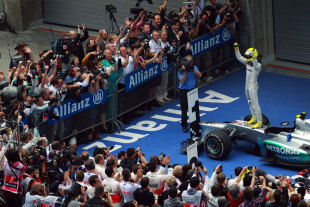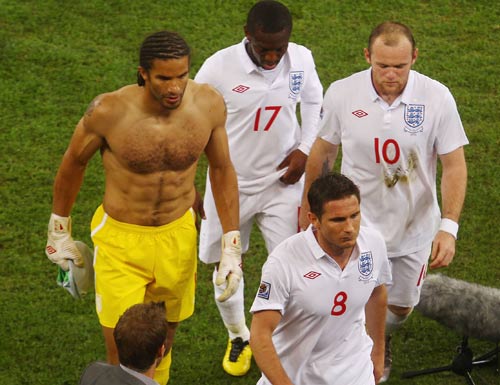
Even casual observers of Formula One know how important a fast car is to success, but the weight of statistics can prove a heavy burden. Nico Rosberg was being written off at the start of this season for not winning a race during his six years in the sport, but realistically he never had a car to do so. The pressure intensified after the first two grands prix as he slipped out of the points at both races and was beaten in qualifying by team-mate Michael Schumacher, who he had previously had the measure of.
It was a curious situation as he was clearly struggling with his tyres, and while one might argue that Rosberg is not the fastest driver on the grid, he has always had a deep understanding of how to set a car up to perform. Before he took his GP2 title in 2005 he was offered a place to study Aeronautical Engineering at Imperial College London and when he joined Williams in 2006 he set the highest score of any previous Williams driver in the compulsory engineering aptitude exam. It's fair to say he knows an option compound from a prime, yet in the first two races of the season he was made to look like a rookie as he cooked his rears in Australia and then struggled to generate sufficient heat in the fronts in Malaysia.
The temperature range in which the 2012-spec Pirellis perform is very narrow this year and tweaks to the car's set-up or even cloud cover can make a huge difference to performance. In Australia the wet conditions during practice appeared to lead the team astray ahead of the dry race and vice-a-versa in Malaysia. But in China the constant cool temperatures allowed Mercedes and Rosberg to find what Ross Brawn called the "sweet-spot" ahead of qualifying. For the first time in his F1 career Rosberg had a car capable of winning a race and he didn't disappoint.
Asked after the race what had made the difference, Rosberg confirmed the above: "Well, it's set-up really, really thinking about what's going on in the race and why are we struggling and trying to improve that situation. Surely the conditions helped us today, I think, but even so, we're just moving forward and that's very nice to see.
"Already from the beginning of the year we've been very strong in qualifying, perhaps more difficult in the race. Now we're still strong in qualifying - very strong, maybe even stronger - and also improving the race, so it's good progress forward and I'm sure that we will continue this ongoing development. It was mainly set-up."
His qualifying lap was particularly impressive as he nailed apex after apex, with his foot buried to the bulkhead out of every corner. Schumacher looked ragged in comparison, but that's not to say he had a bad lap as he was closer to Lewis Hamilton (a useful benchmark) than he had been all season. It was the same story in the race as Rosberg maintained his 0.5s-per-lap advantage over Schumacher on every lap up until the first round of pit stops. Within each of his three stints his lap times varied by less than a second (excluding in laps, out laps and the final lap when he slowed as he crossed the line) as he managed the trade off between tyre degradation and his lowering fuel load to perfection. It was a hugely accomplished victory and proof of what he can achieve with the right car underneath him.
The question now is whether Mercedes can maintain its form over the upcoming races. Its pace in Shanghai suggests the problems earlier in the season were not fundamental issues with the car but rather issues with set-up. That theory will be put to the ultimate test in Bahrain where track temperatures will be double what they were in China and the rear tyres are likely to take a heavy beating out of the slower corners. Victory might not be possible, but a podium will mean Rosberg is a genuine title contender this year. What a difference a good car makes.
Laurence Edmondson is an assistant editor on ESPNF1
© ESPN Sports Media Ltd.
 Laurence Edmondson is deputy editor of ESPNF1 Laurence Edmondson grew up on a Sunday afternoon diet of Ayrton Senna and Nigel Mansell and first stepped in the paddock as a Bridgestone competition finalist in 2005. He worked for ITV-F1 after graduating from university and has been ESPNF1's deputy editor since 2010
Laurence Edmondson is deputy editor of ESPNF1 Laurence Edmondson grew up on a Sunday afternoon diet of Ayrton Senna and Nigel Mansell and first stepped in the paddock as a Bridgestone competition finalist in 2005. He worked for ITV-F1 after graduating from university and has been ESPNF1's deputy editor since 2010

